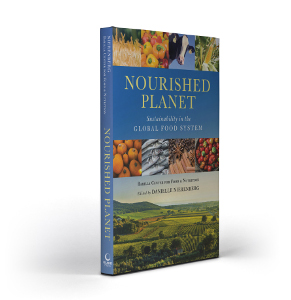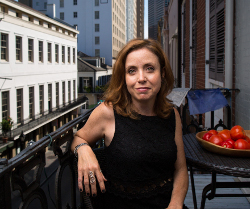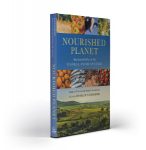Food experts discuss planet wide nutrition
Posted by Elena del Valle on October 4, 2018

Nourished Planet
Photo: Think Tank, Island Press
About 40 percent of the land in the world is used for agriculture and livestock; at the same time in the past 40 years 30 percent of the arable land has become unproductive; and soil erosion and soil degradation are widespread, according to Nourished Planet: Sustainability in the Global Food System Voices from the New Food Movement (Island Press, $25), a newly published book.
Convinced everyone has a right to food and the world needs a food and agriculture system that nourishes all sixteen people contributed their insights to the book “to show what’s working on the ground to alleviate hunger and poverty, prevent food loss and food waste, cultivate the next generation of leaders, and create more equity and social justice in the food system.” From conception to publication the book, edited by Danielle Nierenberg, required a year.
When asked who is the target audience Nierenberg replied by email, “All of us. The more than 7 billion eaters who inhabit the planet. However, we hope that academics and students will take special interest–it’s an easy to read, engaging book, full of hopeful examples of successful projects that can be replicated and scaled up and out in rich and poor countries alike.”
The 250-page softcover book with many graphics and images is divided into four chapters: Food for All, Food for Sustainable Growth, Food for Health and Food for Culture. Each chapter is accompanied by perspectives from several New Food Movement contributors.
The most critical food issues the United States faces today? Nierenberg responded by addressing the topic on a global scale and indicating that climate change and other environmental problems that impact the food system should create a sense of urgency; food production contributes 30 percent or more of all greenhouse gas emissions and there are some 815 million people who are hungry, while another 2 billion are overweight and obese; and that massive amounts of food are lost or wasted before they can reach peoples’ stomachs, at least one third worldwide.
She believes action from the grassroots and the top is necessary, she said by email. She also supports the participation of organizations and communities, researchers and scientists, corporate leaders, and decision-makers to make the food system better.

Danielle Nierenberg, editor, Nourished Planet
When asked what defines the new food movement the book editor replied, “The interest in food has been growing for decades–wealthy consumers have wanted local, fresh, healthy, sustainably grown food–but today we need a food system that goes beyond our personal lives and impacts the women and men all over the globe who depend on the food system for their livelihoods. We need a food system that focuses on equality among women and men, that considers future generations, that helps create opportunities for young people to become not only food producers, but also scientists and researchers, story tellers and advocates, business leaders, and policy makers who can change the way we grow, process, and consume food.”
The definition of farming and food system for purposes of this discussion is she said, “A food system is all of the activities involving the production, processing, transport, sale, and consumption of food. Sustainable food systems are those that are economically, environmentally and socially sustainable–they are regenerative and resilient by helping build soils, protect water and biodiversity, and they recognize the importance of women, workers, and youth for the future of agriculture.”
When asked about groups in particular need she said, “Poor and underserved communities often are labeled food deserts because of a lack of grocery stores or markets providing healthy food. Racism and lack of economic communities lead to chronic health problems including diabetes, heart disease, and obesity in communities that lack the resources to address these problems.”
The book contributors are Hilal Elver, special rapporteur on the Right to Food, United Nations; Hans R. Herren, president, Millenium Institute, and president, Biodivision Foundation; Sieglinde Snapp, agronomist, professor of Soils and Cropping Systems Ecology, Michigan State University, and associate director, Center for Global Change and Earth Observations; author Vandana Shiva; Dario Piselli, founder, Sustainable Development Solutions Network; Steve Brescia, chief executive officer Groundswell International; Shaneica Lester and Anne-Teresa Birthwright, 2016 winners of Young Earth Solutions; Alexander Müller, study leader, United Nations Environment Programme–hosted project The Economics of Ecosystems and Biodiversity for Agriculture & Food; Bruce Friedrich, executive director, The Good Food Institute; Tristram Stuart, founder, Feedback; Natasha Bowens, author, The Color of Food: Stories of Race, Resilience and Farming; Lindsey Shute, executive director National Young Farmers Coalition; Stephen Ritz founder, Green Bronx Machine; Ruth Oniang’o, founder, Rural Outreach Programme.

Click to buy Nourished Planet









